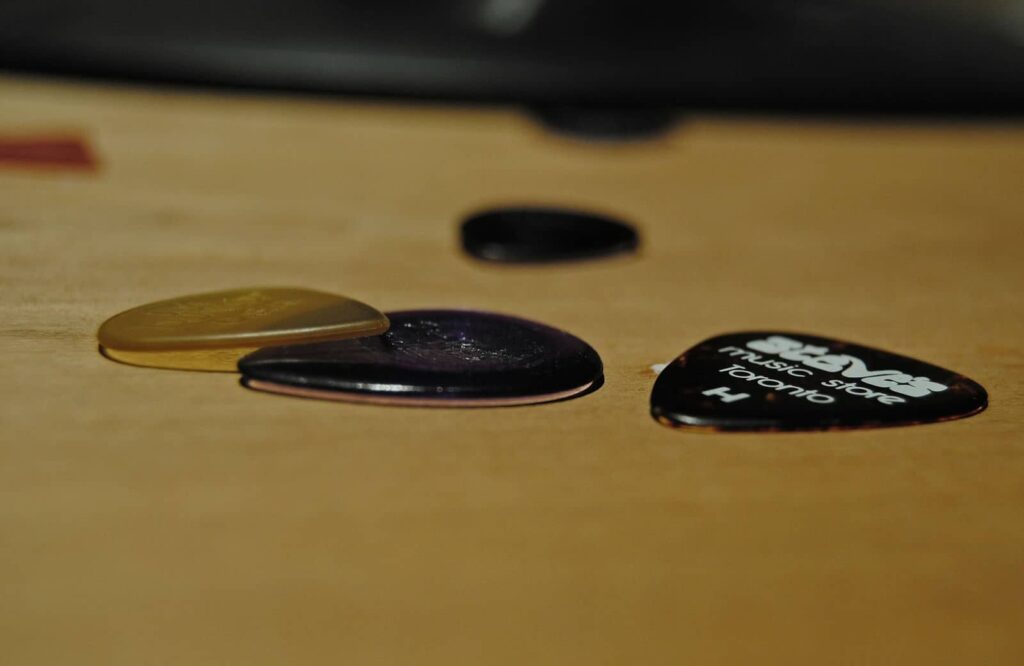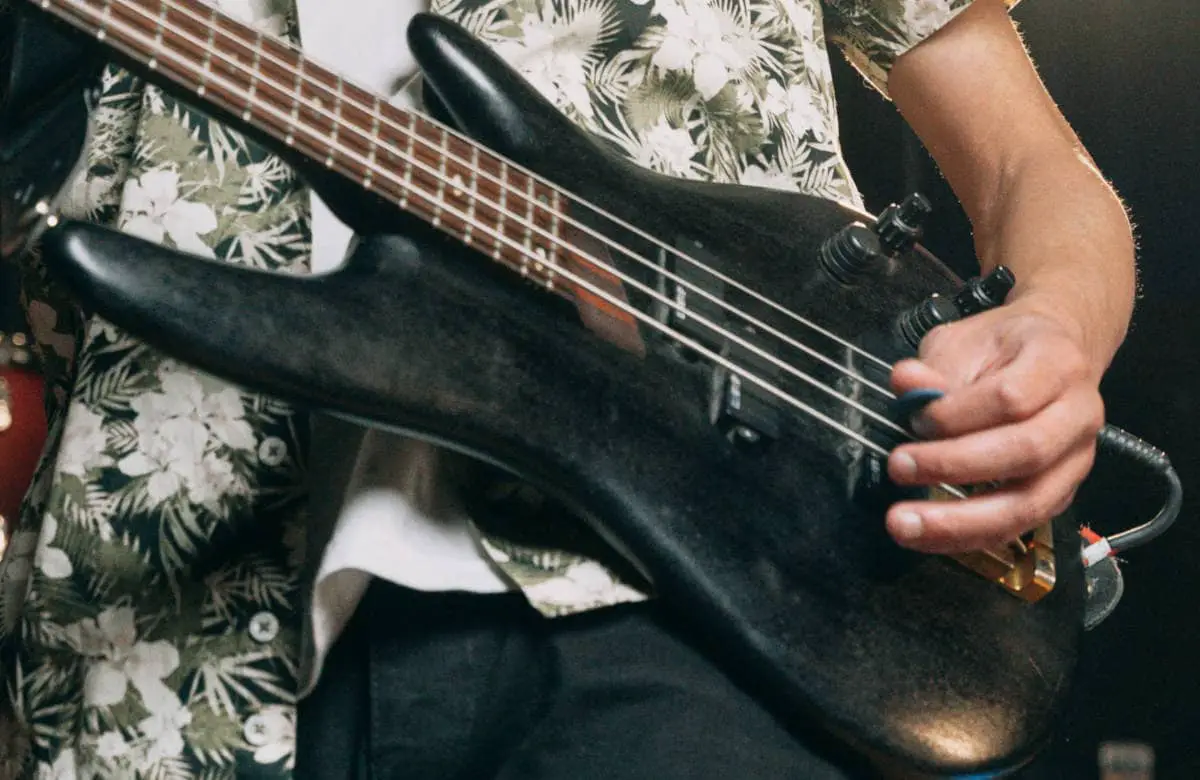If you have been playing bass for a while, chances are that you have heard the phrase: “Real bass players don’t use picks”. Still, there are countless successful bassists out there who use picks, and I prefer using one myself in certain genres. Thus, I did some research and took a look at my own experiences to find out; is playing bass with a pick bad?
Playing bass with a pick is not bad or inferior to playing with your fingers. The 3 most successful bassists in the world all played with a pick. Playing with a pick is a stylistic choice that produces a different sound than fingerstyle and makes certain techniques easier.
So no, playing with a pick is not bad.
You might also have noticed that when people claim that bass players shouldn’t use picks, they tend to do so in a certain way. They make a general, radical statement about bassists, and will rarely elaborate why on why they feel that way.
But where did this stigma come from? And what’s the difference between playing with a pick and with your fingers?
Playing bass with a pick vs fingers
Playing bass with your fingers makes it easier to reach and switch between strings, while a pick makes it easier to play chords and to play individual notes faster. A pick produces a more percussive and punchy sound that cuts through the mix, while fingerstyle produces a smoother sound that blends into the mix.
This means that there are two main categories that matter when bassists choose to play with a pick or fingers:
- Style – Personal preference, how you play, what you are looking to do with the bass, whether you need control or speed
- Sound – Punchy or smooth? Heavy or soft genre? What type of role does the band need to fill in your band?
Thus, there are many factors that impact why a bassist chooses to play bass with a pick or fingers, and there is no universally right answer.
It`s worth noting that some bassists prefer to play with a pick live in order to make the bass more noticeable. Gene Simmons of Kiss summed up the idea behind this nicely with this quote:
“Respectfully, studio musicians who play with their fingers live have no idea that we can’t hear what they’re playing because there’s no actual definition on the note that’s coming out.
Gene Simmons – Music Radar 2019
Different settings thus require bassists to switch things up. This is especially true between the studio and live shows, and between heavier and softer songs.
Thus, while most bassists have a preferred style, almost all successful bassists have switched up their style at some point when it was appropriate.

Why is playing bass with a pick considered bad?
The idea that real bass players don’t use picks has been around for many decades now. I’ve heard countless reasons why people feel this way. These reasons are usually condescending, elitist, and poorly thought out.
Still, there are some theories that actually serve to explain how this stigma came about. Here are the 3 that make the most sense to me:
- Double Bass Purism – The bass guitar is based on the double bass, which is mainly played by plucking the strings (fingerstyle). Thus, real bassists did actually not use picks before the 1950s when the bass guitar reached en mainstream market. Thus, one theory is that the stigma around playing bass with a pick comes from modern musicians having appropriated the bass.
- Guitarists switching to bass – If you are a bassist, you might play the bass with a pick. If you are a guitarist, you most definitely play the bass with a pick. Because guitarists who switch to bass predominately play with a pick, this has created a negative stereotype of pick players at large.
- “Failed guitarist” – There have always been more guitarists than bassists. I asked some guitarists and bassists in the industry about this dichotomy, and they all believed that the ratio of bassists to guitarists is between 3:1 and 10:1. The majority held that it was between 4:1 and 6:1, regardless of what instrument they themselves played. I have also experienced that bassists in bands, especially rock and metal, are occasionally guitarists that made the switch in order to have a full line-up. When this switch happens, it’s commonly the worst guitarist that becomes the bass player, and rarely the best. These bassists almost exclusively play with a pick.
The above points merely serve as an explanation of how this stigma came about. They are not arguments for why playing with a pick is bad. As you are about to learn below, playing with a pick has worked well for some of the most successful bassists of all time.
Bass players who use a pick
There are tons of successful bassists who have played with a pick, and tons who have played fingerstyle.
What’s interesting is that the most commercially successful bassists of all time have all used picks. Some of them have used other styles as well, but they are all predominately pick players:
| Bassist: | Band (most notable): | Style: | Net Worth: |
| Paul McCartney | The Beatles | Pick. Fingers on rare occasion | $1 200 000 000 |
| Sting | The Police | Pick and Fingers (Pick with The Police) | $400 000 000 |
| Gene Simmons | Kiss | Pick | $400 000 000 |
| Adam Clayton | U2 | Pick and fingers | $400 000 000 |
| Roger Waters | Pink Floyd | Pick. Fingers on quieter songs | $310 000 000 |
The two most commercially successful bassists that are mainly known for playing fingerstyle are John Deacon of Queen and Flea of the Red Hot Chili Peppers. To put this into perspective, both their net worths are just above $100 000 000.
Conclusion
There is no universal answer to how you should be playing the bass. What is important, is that you understand the pros and cons of each style. You also need to understand how this impacts the sound of your band as a whole.
The most successful bassists of all time have gravitated towards playing with a pick, but they have all switched it up at different points in their careers. Even Gene Simmons who exclusively uses a pick has mimicked fingerstyle in the music video for “I was made for lovin you”. Presumably, because it looked cooler.
Some believe pick players to be failed guitarists. Some believe the bass was made to be played with fingers.
While we can`t know for sure how this stigma came about, we know one thing for sure. Playing with a pick has worked for the most successful bassists of all time. It is a stylistic choice that all bassists have to make, and there are no right or wrong answers when it comes to style.

